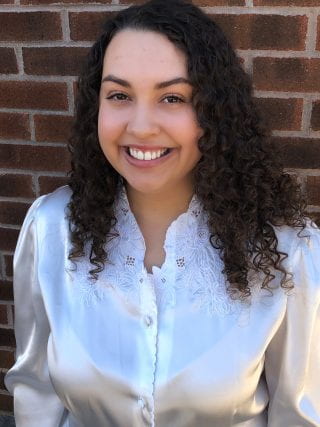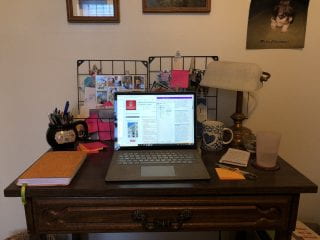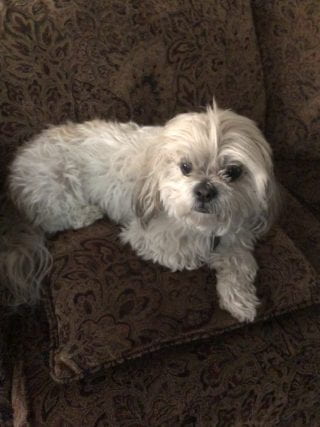This blog is from Emily Snyder, a University of Arkansas Honors College student who served as the Special Collections intern during the unprecedented circumstances of Summer 2020.

It is widely accepted at this point that everyone’s year has gone differently than expected. The COVID-19 pandemic created a novel situation that no one could have predicted, and the plans many people had for their lives in 2020 did not come to pass. I have talked to people who were going to study abroad and had to stay home all summer instead, who had jobs or internships lined up that were completely cancelled, or whose plans were changed to an online format as my internship was. I was set to work in Special Collections at the University of Arkansas library this summer, and as circumstances surrounding the university’s status changed, so did my role as an intern.
My first meeting about the internship occurred the Friday after the announcement that all classes would be moving online starting the following Monday. Campus that next morning felt oddly apocalyptic. There were so few people around and when I went to Starbucks for a coffee, all the shelves were bare as students rushed to use their remaining dining dollars before everything closed. As I sat waiting for my meeting time, I was one of two people in the Helen Walton reading room, which is usually teeming with students focused on their work. In the meeting, we discussed possible tasks for me to work on, one of which was an exhibit on Arkansas tourism, which excited me. We briefly considered what would happen if the university closed, and therefore the library along with it. I left enthusiastic about getting to work in Special Collections and happily anticipating the future assignments I would have.
When the university did close, I decided that I still wanted the opportunity to do the internship, even if I never got to set foot in the library during it. The exhibit on Arkansas tourism was no longer to happen and my interaction with the materials shifted to a completely online experience. I was disappointed that I would not get to go into the physical building every day, as a big part of my desire to do the internship was to experience the environment of doing archival work in a university setting, but I was determined to make the most of it. I began working on what I could from home, relying heavily on the Digital Collections and the thorough finding aids. Without these incredible resources of Special Collections, I do not think I would have been able to do the work I did this summer. These made it possible for me to work on the two big projects I had this summer, creating two LibGuides, compilations of resources concerning a specific topic to aid in research, and creating metadata for the Arkansas Traveler digital collection along with a team of other staff members. Having these big projects that would take me the entire summer to complete but not having a specific time of day that I went to work and focused on them created some problems for me. I found myself struggling to differentiate between my work and relaxation times as my home became my office as well. For me, the solution to this was setting up a routine that included a set time for my work and not letting myself work beyond that to ensure that I did not burn myself out by not taking time to rest.

As I faced these challenges throughout this summer, one of the most helpful things for me was the meetings I attended with other Special Collections staff members. These meetings gave me a dose of what I had most wanted to experience in this internship: the interaction with people who work in university archives and what it is like to work in that setting. These meetings gave me these connections, but they also taught me a lot about the situation I and so many other people have been in during this pandemic. Working alone all day, I found myself questioning the work I was doing and what I was producing. I would wonder if I was doing a good job and how to best work from home with limited access to all the resources available. My first meeting with the team of people working on the Arkansas Traveler project provided a bit of a revelation to me. I had been so worried that I was picking the wrong words or phrasing and thought I was the only one struggling because I was just an intern. But, as the other staff members asked what types of keywords people were using and then everyone seemed to answer a little differently, I realized that we were all in the same boat. We were all sitting at home, trying to figure out the correct way to do our jobs.

I saw this trend repeated at division wide meetings, where the staff would talk about what they had been working on, what they were doing moving forward, and often, what challenges they were facing because of the unique circumstances COVID had put them in. Ultimately, everyone is trying to figure out how to do their jobs during a pandemic. Everyone is trying to juggle all the new things they have to do while staying on top of their old tasks. Everyone is just doing their best and hoping it works out. When you are at home working alone, it can feel like you are the only one who is struggling to get it all done while also balancing their job and their lives as their home becomes their place of work and rest. Being in these meetings gave me this new perspective and allowed me to accept that we are all trying our best to adapt to the changes life has thrown at us.
Throughout the summer, things continued to change and develop out of the circumstances we found ourselves in. Projects that were planned ended up not happening as different tasks were prioritized. The inability to go to the actual library to reach materials created conflicts, but things had to be taken in stride and solutions were found. At the end of the summer, I found myself thankful for the opportunity and the knowledge I gained in my field as well as for my personal life.

Nice work. Summarizes what much of the world has and continues to deal with in their work.